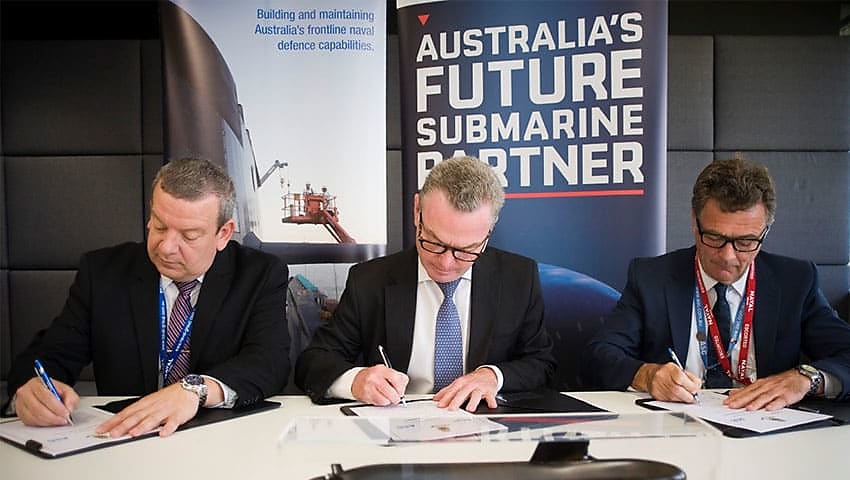Defence Minister Christopher Pyne has announced another formal contract signing as work on the $50 billion SEA 1000 Attack Class submarine project continues to gain momentum.
Coming just two weeks following the signing of the Strategic Partnering Agreement (SPA), Defence Minister Christopher Pyne has confirmed the signing of another critical document for the future of Australia's Attack Class future submarines.
Confirming the formal signing of the Framework Agreement between Naval Group Australia and ASC, Minister Pyne said the agreement would identify ways Naval Group Australia and ASC would collaborate for the provision of supplies and services to each other to support Australia's through-life, sovereign submarine capability.
"The Framework Agreement includes workforce development such as training apprentices, occupational health and safety training and services, as well as helping Naval Group tap into ASC’s existing supply chain," Minister Pyne said.
Naval Group Australia and ASC will establish joint working groups to manage the Framework Agreement and identify, develop and recommend other collaboration opportunities.
John Davis, Chief Executive Officer, Naval Group Australia welcomed the formal signing, saying, "Naval Group and ASC are natural partners, we share common values and are ideally placed to maximise the synergies between the ongoing Collins Class sustainment program and the design and build of the Attack Class submarines."
The Framework Agreement details the terms and conditions through which Naval Group Australia and ASC will collaborate through separate commercial arrangements for the provision of supplies and services to each other, including:
- Workforce development: co-ordinate resources and talent pools to plan future activities in support of both Australian Sovereign Submarine Programs;
- OH&S training and services: draw on ASC’s well established safety culture and system to support Naval Group Australia to grow its own safety program in Australia; and
- Supply chain services: draw on each other’s existing supply chain knowledge to further develop the supply chains and opportunities for local industry in the Australian Sovereign Submarine Programs.
"This innovative collaboration with ASC is a key enabling component of Naval Group’s commitment to design and build 12 Attack class submarines. It will support the development of a sovereign submarine capability, providing economic benefits and supporting industrial development to deliver a multi-generational submarine enterprise to Australia," Mr Davis added.
ASC Chief Executive Officer Stuart Whiley said, "It’s an exciting time for ASC and our people to be working with Naval Group for the Attack Class Submarine program and this agreement will provide Collins Class life-extension program access to Naval Group technology.
"With Naval Group and ASC working together, I’m confident that both Australian Sovereign Submarine programs will deliver for Australia now and in the future," Whiley explained.
Minister Pyne added, "Today’s signing of the Framework Agreement demonstrates the close co-operation needed to grow the submarine workforce for many decades to come."
Naval Group's successful Shortfin Barracuda design, which serves as the basis for the new Attack Class, is a conventionally-powered variant of the nuclear-powered Barracuda fast attack submarine currently under construction for the French Navy.
Lockheed Martin will provide the AN/BYG-1 Combat control System, which provides an open-architecture submarine combat control system for analysing and tracking submarine and surface-ship contacts, providing situational awareness as well as the capability to target and employ torpedoes and missiles.
The 12 vessels will be built by Naval Group at a specialist submarine shipyard at Osborne, South Australia. The Commonwealth government’s Australian Naval Infrastructure program will support the development of the future submarine shipyards.
"This Framework Agreement is a great early step to ensure ASC Submarines has a role in delivering the Attack Class as well as sustaining our existing Collins Class fleet," Minister Pyne explained.
The Attack Class will enter service with the Royal Australian Navy at a time when 50 per cent of the world’s submarines will be operating in the Indo-Pacific region.








